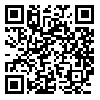Volume 10, Issue 2 (Winter 2025)
Health in Emergencies and Disasters Quarterly 2025, 10(2): 85-94 |
Back to browse issues page
Download citation:
BibTeX | RIS | EndNote | Medlars | ProCite | Reference Manager | RefWorks
Send citation to:



BibTeX | RIS | EndNote | Medlars | ProCite | Reference Manager | RefWorks
Send citation to:
khankeh H R, Farrokhi M, Hosseinabadi-farahani M, Saatchi M, Ahmadi S, Roudini J, et al . Challenges of Social Trust in Disaster Management Focusing on COVID-19 in Iran: Recommendations for Gaining it Again. Health in Emergencies and Disasters Quarterly 2025; 10 (2) :85-94
URL: http://hdq.uswr.ac.ir/article-1-588-en.html
URL: http://hdq.uswr.ac.ir/article-1-588-en.html
Hamid Reza Khankeh1 

 , Mehrdad Farrokhi1
, Mehrdad Farrokhi1 

 , Mohammadjavad Hosseinabadi-farahani2
, Mohammadjavad Hosseinabadi-farahani2 

 , Mohammad Saatchi1
, Mohammad Saatchi1 

 , Sina Ahmadi3
, Sina Ahmadi3 

 , Juliet Roudini4
, Juliet Roudini4 

 , Amin Rahmatali Khazaee1
, Amin Rahmatali Khazaee1 

 , Mariye Jenabi Ghods2
, Mariye Jenabi Ghods2 

 , Elham Sepahvand5
, Elham Sepahvand5 

 , Maryam Ranjbar1
, Maryam Ranjbar1 

 , Taleb Badri6
, Taleb Badri6 

 , Mohammad Pourebrahimi *7
, Mohammad Pourebrahimi *7 




 , Mehrdad Farrokhi1
, Mehrdad Farrokhi1 

 , Mohammadjavad Hosseinabadi-farahani2
, Mohammadjavad Hosseinabadi-farahani2 

 , Mohammad Saatchi1
, Mohammad Saatchi1 

 , Sina Ahmadi3
, Sina Ahmadi3 

 , Juliet Roudini4
, Juliet Roudini4 

 , Amin Rahmatali Khazaee1
, Amin Rahmatali Khazaee1 

 , Mariye Jenabi Ghods2
, Mariye Jenabi Ghods2 

 , Elham Sepahvand5
, Elham Sepahvand5 

 , Maryam Ranjbar1
, Maryam Ranjbar1 

 , Taleb Badri6
, Taleb Badri6 

 , Mohammad Pourebrahimi *7
, Mohammad Pourebrahimi *7 


1- Health in Emergency and Disaster Research Center, University of Social Welfare and Rehabilitation Sciences, Tehran, Iran.
2- Department of Nursing, School of Rehabilitation Sciences, University of Social Welfare and Rehabilitation Sciences, Tehran, Iran.
3- Social Development and Health Promotion Research Center, Health Institute, Kermanshah University of Medical Sciences, Kermanshah, Iran.
4- Research Fellow-patient and Stakeholder Engagement, Berlin Institute of Health, Berlin, Germany.
5- Department of Nursing, School of Nursing and Midwifery, Lorestan University of Medical Sciences, Khoramabad, Iran.
6- Behavioral Sciences Research Center, Life Style Institute, Baqiyatallah University of Medical Sciences, Tehran, Iran.
7- Nursing Care Research Center, School of Nursing, Clinical Science Institute, Baqiyatallah University of Medical Sciences, Tehran, Iran. ,pourebrahimi62@gmail.com
2- Department of Nursing, School of Rehabilitation Sciences, University of Social Welfare and Rehabilitation Sciences, Tehran, Iran.
3- Social Development and Health Promotion Research Center, Health Institute, Kermanshah University of Medical Sciences, Kermanshah, Iran.
4- Research Fellow-patient and Stakeholder Engagement, Berlin Institute of Health, Berlin, Germany.
5- Department of Nursing, School of Nursing and Midwifery, Lorestan University of Medical Sciences, Khoramabad, Iran.
6- Behavioral Sciences Research Center, Life Style Institute, Baqiyatallah University of Medical Sciences, Tehran, Iran.
7- Nursing Care Research Center, School of Nursing, Clinical Science Institute, Baqiyatallah University of Medical Sciences, Tehran, Iran. ,
Abstract: (3255 Views)
Background: Social trust in relief organizations is one of the prerequisites for community preparedness for disasters. This study aims to explore the challenges of social trust in disaster management in Iran with a focus on the COVID-19 pandemic, and provide recommendations for building social trust.
Materials and Methods: This is a qualitative study using a conventional content analysis method. Participants were 27 lay people and managers of emergency and relief organizations in Tehran who were selected purposefully with maximum diversity. We used in-depth semi-structured interviews to explore their experiences and perceptions. Data analysis was performed using MAXQDA software, version 2018 and Graneheim and Lundman’s content analysis method.
Results: In this study, two main themes emerged, “challenges to building social trust” and “recommendations for building social trust.” The challenges had four categories: Managerial issues, misunderstanding of the situation, lack of transparency, and lack of coordination. The recommendations had three categories: Management improvement, efficient risk communication, and experience-based interventions.
Conclusion: Social trust during disasters in Iran can be improved by transparency in the performance and tasks of relief organizations, timely and accurate provision of information (risk communication), and emphasis on social participation and solving managerial issues.
Materials and Methods: This is a qualitative study using a conventional content analysis method. Participants were 27 lay people and managers of emergency and relief organizations in Tehran who were selected purposefully with maximum diversity. We used in-depth semi-structured interviews to explore their experiences and perceptions. Data analysis was performed using MAXQDA software, version 2018 and Graneheim and Lundman’s content analysis method.
Results: In this study, two main themes emerged, “challenges to building social trust” and “recommendations for building social trust.” The challenges had four categories: Managerial issues, misunderstanding of the situation, lack of transparency, and lack of coordination. The recommendations had three categories: Management improvement, efficient risk communication, and experience-based interventions.
Conclusion: Social trust during disasters in Iran can be improved by transparency in the performance and tasks of relief organizations, timely and accurate provision of information (risk communication), and emphasis on social participation and solving managerial issues.
Type of article: Research |
Subject:
Qualitative
Received: 2023/11/27 | Accepted: 2024/07/7 | Published: 2025/01/1
Received: 2023/11/27 | Accepted: 2024/07/7 | Published: 2025/01/1
Send email to the article author
| Rights and permissions | |
 |
This work is licensed under a Creative Commons Attribution-NonCommercial 4.0 International License. |





